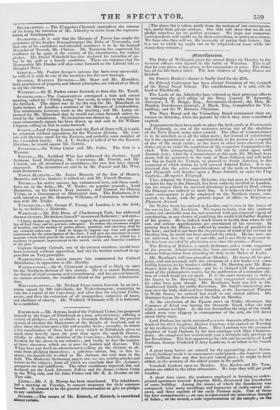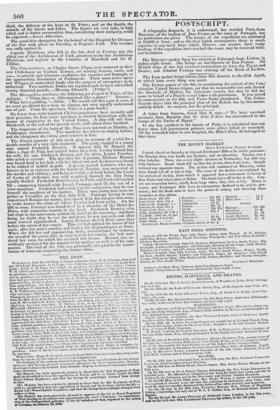The Duke of Wellington gives his annual dinner on Monday
to the General officers who figured in the battle of Waterloo. This is all that he ever gives, or has given, to his companions in arms. The Duke has all his life been a taker. The iron shutters of Apsley House are finished.
Sir Francis Burdett's dinner is finally fixed for the 27th.
Sir Edward Codrington has been elected President of the Council of the Royal Naval School. The establishment, it is said, will be fixed at Blackheath.
The Lords of the Admiralty have selected as their principal officers in managing the civil affairs of the Navy, Captain W. Symonds, Surveyor; J. T. Briggs, Esq., Accountant-General ; the Hon. R.
Dundas, Storekeeper-General ; J. Meek, Esq., Comptroller for Vie- Walling; and Sir W. Burnett, Physician.
The Navy Board and the Victualling Board terminated their eIt- istenee on Saturday, when the patents by which they were constituted expired.
Arrangements have been made to place the dock-yards at Portsmouth and Plymouth, as one of the measures arising out of the abolition of the Navy Board, under other control. The office of Commissioner is to be annulled, as at all the other ports ; hut instead of substituting for it the appointment of a superintendent, in the person of a captain of one of the royal. yachts, as has been in other cases observed, the
duties are to be under the regulation of the respective Commanders-in- chief. This arrangement, however, will not be acted upon until January next ; when the Commissioner at this port, Sir Michael Ser. mour, will be promoted to the rank of Rear-Admiral, and will hoist
his flag on board the 'Vernon, to proceed to South America, in the command of which station he will succeed Admiral Baker. It is un- derstood that the active superintendence of the yards at Portsmouth and Plymouth will devolve upon a Rear-Admiral, or upon the Flag Captain.—Hampshire Telegraph.
Vice-Admiral Sir Pulteney Malcolm, Who had gone to Portsmouth to hoist his flag in the Donegal, has been suddenly recalled to London. On his return there lie received directions to proceed to Deal, where the Donegal was ordered to meet him. It is believed that a force of some consequence is to be employed on the Northern coasts, con- nected, no doubt, with the present aspect of affairs in Belgium.— Plymouth Journal.
Sir Walter Scott has arrived in London, and is now at the house of his son-in-law, Mr. Lockhart. We regret to learn, that this eminent writer amid admirable man has not returned with any renewed vigour of constitution, or any chance of gratifying the world with further displays of his genius. He is, indeed, much worse in health than when he set out, and serious apprehensions are entertained of his recovery. In passing down the Rhine, he suffered by another stroke of paralysis in the boat; and had it not been for the presence of mind of his servant in
bleeding him, he could not have survived the attack. He has now, we are informed, lost the use of one side, and is not likely to recover it. He has been attended by physicians ever since his return.— Times.
The Bishop of Killaloe, a stanch Reformer, and a warm supporter of the present Administration, has been preveuted by a severe and tedious indisposition from attending- his duty in the House of Lords.
Mr. Bentham's will was proved on Monday. He leaves all his pro- perty, real and personal, with the exception of a few books and some trifling legacies, to his brother's children. Dr. Boss-ring gets Mr. Ben-
tham's share in the Westminster; and he is charged with the arrange- ment of the philosopher's works, for the publication of a complete edi-
tion of which funds are set apart. It is the more necessary to notice the legacy to Dr. Bowring, because very exaggerated statements of its value have gone abroad. Mr. Bentham's body was left to Dr.
Southwood Smith, for public dissection. Dr. Smith's interesting ora- tion over the body, delivered last Saturday, at the Anatomical Theatre in Webb Street, we noticed last week in our second edition. Dr. Grainger began the dissection of the body on Monday.
At the conclusion of the Epsom races on Friday afternoon, the Countess of Errol was leaving the Stewards' Stand, when she Met with a serious accident. As she was descending the steps of the stand, which were very slippery in consequence of the rain, she fell down about thirty steps.
Lord Durham has again sustained a severe domestic affliction by the
death of his third daughter, Harriet Caroline, who expired on Tuesday at his residence in Cleveland Row. Miss Lambton was the youngest
daughter of Lord Durham, by his first marriage with Miss Cholmon- deley : she completed her seventeenth year a fortnight only previous to her dissolution. The heir apparent to the title and possessions of Lord Durham, George Frederick d'Arcy Lambton, is an infant in his fourth year.
A great many horses are entered for the approaching Ascot Races. A very brilliant week is in consequence anticipated,—the reporter says, more brilliant than any that haveyet taken; place ; he ought to have added, in the memory of the oldest groom in the parish.
Vauxhall Gardens open on Monday. Mrs. Keeley and Mr. Tem- pleton are added to the other attractions. We hope they will get good weather.
A short time since, the workmen employed in forming an under- ground-apartment beneath Kingston Mills, discovered the foundation of some building. Among the stones of which the foundation was composed, were many mouldings and fragments of richly-carved cor- nices, and three capitals of the early Norman style, One of these has four compartments ;—on one, is represented the miraculous draught of fishes ; on the second, a rude representation of the temple; on the third, the delivery of the keys to St. Peter; and on the fourth, the miracle of the loaves and fishes. The figures are very rude, in high relief, and in better preservation than, considering their antiquity, could be expected.—Lewes Advertiser.
The usual fete champetre for the behoof of the Hospital for Diseases of the Ear took place on Tuesday, at Regent's Park. The weather was sadly against it.
Captain Markham, who. fell in the late duel at Fermoy, was the eldest son of the Archdeacon of York, grandson to the late Archbishop Markham, and nephew to the Countess of Mansfield and Sir R. Clifton.
The Conservatives, or Charles Street Clique, now removed to their new Club-house on Carlton Terrace, are moving heaven' earth, and to provide and stimulate candidates for counties and boroughs at the approaching dissolution of Parliament. Their most active agent and Whipper-in states their funds (for the purpose of corruption) to be unlimited. Two northern Dukes are reported each to have subscribed twenty thousand pounds.—Morning Chronicle. [Fudge!] , The Metropolitan attributes the following jell &esprit to Yates, of the Adelphi. " When does an Alderman look like a ghost?" Answer- " When he's a qobbling."—Globe. [We would call this a jeu de mots, if we must go abroad for a term to express our own equally understood one of pun. From the specimen, Yates is a poor hand.]
No fewer than eight hundred Chelsea-pensioners have recently sold their pensions, for four years' purchase, to furnish themselves with the means of emigrating to the United States. A ship will sail from Blackwall, at the end of the present week, with about three hundred.
The fragments of the body of Air. Pans were interred on Monday, in Paddington churchyard. The murderer has taken to singing hymns, and the clergymen are taking great interest in him.
The French journals of this week give an account of a trial for a double murder of a very dark character. The party charged is a young man named Frederick Benoist. It appears that M. Benoist the elder, a Juge de Paix, had quitted home on a visit, leaving behind him his wife, his son, Frederick Benoist, and his niece, Louise Feucher, . who acted as servant. The day after his departure, Madame Benoist was found dead in her bed, with her throat cut, and the house was found to be robbed of 6,000f. in gold. A person named Labauve, who was known to be at variance with the family of Benoist, was suspected of the murder and robbery; and being arrested, and tried before the Court of Assize of Ardennes, was only acquitted through the Jury being equally divided. FredericIE 13enoist mile to Paris, and lived a debauched life; connecting himself with Joseph Formage, aged 17, the son of a wine-merchant. Frederick had revealed to his companion, that he was himself the murderer of his mother. These two young men were to- gether at Versailles on the 2Ist July 1831.. Formage having in vain importuned Benoist for money, threatened, if he did not give him some, to make known the crime of which Benoist had been guilty. On the 22d at noon, Formage was found dead in a chamber of the Hotel des Bains, with numerous wounds in the head. Frederick Benoist, who had slept in the same room, quitted the hotel in the morning; and there being no doubt that he was the murderer, he was pursued, and after some interval apprehended. Louise Fvuelier died at Paris some days before the arrest of her cousin. This gill had quitted the house of her uncle, after her aunt's murder, and lived a life of prostitution at Paris. When she felt her end approaching, being overwhelmed by remorse, she revealed the secret that, in concert with her cousin, she had mur- dered her aunt, for which she received 600 francs. Benoist was ac- cordingly arraigned for the murder of his mother, as well as of his com- panion. The trial of the llth was principally occupied in the exami- nation of witnesses respecting the former crime.




























 Previous page
Previous page